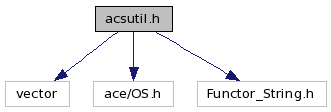#include <vector>#include <ace/OS.h>#include <Functor_String.h>
Go to the source code of this file.
Defines | |
| #define | ACS_HAS_TAO |
| #define | CDB_HAS_ANY |
| #define | ACS_HAS_DLL |
| #define | ACS_DLL_EXPORT ACE_Proper_Export_Flag |
| #define | ACS_DLL_IMPORT ACE_Proper_Import_Flag |
| #define | ACS_DLL_UNMANGLED_EXPORT extern "C" ACS_DLL_EXPORT |
| #define | USING_NAMESPACES |
| #define | NAMESPACE_BEGIN(ns) namespace ns { |
| #define | NAMESPACE_END(ns) } |
| #define | NAMESPACE_USE(ns) using namespace ns; |
| #define | NAMESPACE_DIR(ns, code) ns##::##code |
| #define | ACS_NEW_RETURN(POINTER, CONSTRUCTOR, RET_VAL) ACE_NEW_RETURN(POINTER,CONSTRUCTOR,RET_VAL) |
| #define | ACS_NEW(POINTER, CONSTRUCTOR) ACE_NEW(POINTER,CONSTRUCTOR) |
Typedefs | |
| typedef std::vector< ACE_CString > | ACE_CString_Vector |
Detailed Description
Header file for lots of fun goodies probably of no interest to anyone outside of the ACS team.
Define Documentation
| #define ACS_DLL_EXPORT ACE_Proper_Export_Flag |
Means ACS does not use static libraries. Some sort of export flag.
| #define ACS_DLL_IMPORT ACE_Proper_Import_Flag |
Some sort of export flag.
| #define ACS_DLL_UNMANGLED_EXPORT extern "C" ACS_DLL_EXPORT |
Some sort of export flag.
| #define ACS_HAS_DLL |
This old macro dealing with Orbacus can probably go. Means we do not support the Windows OS. Means ACS uses shared libraries.
| #define ACS_HAS_TAO |
Means ACS uses TAO.
| #define ACS_NEW | ( | POINTER, | ||
| CONSTRUCTOR | ||||
| ) | ACE_NEW(POINTER,CONSTRUCTOR) |
DESCRIPTION: Allocate memory on the heap.
Same as ACS_NEW_RETURN, but doesn't return a specific value from the current function. Use this in functions returning void, and ACS_NEW_RETURN in all other functions.
SEE ALSO: ACE_NEW
| #define ACS_NEW_RETURN | ( | POINTER, | ||
| CONSTRUCTOR, | ||||
| RET_VAL | ||||
| ) | ACE_NEW_RETURN(POINTER,CONSTRUCTOR,RET_VAL) |
DESCRIPTION: Allocate memory on the heap.
Allocate memory on the heap using constructor CONSTRUCTOR and point POINTER to it. In case of a failure, set *errno* to *ENOMEM* and return from the current function with RET_VAL.
NOTE: Do not use this macro when using placement *new*; rather use ACE_NEW_RETURN.
Placement *new* allows you to to preallocate memory, and at a later time instantiate an object into that memory. Of course, you can instantiate objects in that same memory more than once, thereby reducing the number of memory allocations.
EXAMPLE:
MyClass* AttemptToAllocate() { MyClass *my_object;
ACS_NEW_RETURN(my_object, MyClass(), 0); return my_object; }
| #define CDB_HAS_ANY |
Means ???.
| #define NAMESPACE_BEGIN | ( | ns | ) | namespace ns { |
| #define NAMESPACE_DIR | ( | ns, | ||
| code | ||||
| ) | ns##::##code |
| #define NAMESPACE_END | ( | ns | ) | } |
| #define NAMESPACE_USE | ( | ns | ) | using namespace ns; |
| #define USING_NAMESPACES |
Defines we can use namespaces. NOTE:
- why is this necessary any more?
Typedef Documentation
| typedef std::vector<ACE_CString> ACE_CString_Vector |
Vector of ACE_CString
 1.7.0
1.7.0